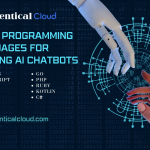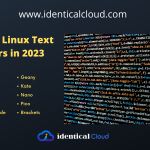Top best programming languages for beginners 2023
Top best programming languages for beginners 2023
Aspiring programmers embarking on their coding journey often face the daunting task of choosing the right programming language to learn. With technology advancing rapidly, it’s crucial to select a language that offers a gentle learning curve while being relevant and in demand. In this blog, we will explore the top best programming languages for beginners in 2023, considering factors such as ease of use, versatility, community support, and future prospects.
Python
Python continues to dominate as one of the most popular programming languages for beginners. Renowned for its simplicity and readability, Python’s clean syntax makes it an excellent choice for beginners to grasp fundamental programming concepts. It offers extensive libraries and frameworks, such as Django for web development and TensorFlow for machine learning, making it versatile and applicable to various domains. Python’s strong community support and vast resources also make it an ideal language for beginners to seek guidance and learn from experienced developers.
JavaScript
JavaScript is an essential programming language for web development and is widely used to create dynamic and interactive web pages. Its versatility extends beyond the web, as JavaScript can now be used for server-side programming (Node.js) and mobile app development (React Native). With an intuitive syntax and a vast ecosystem of libraries and frameworks like React and Vue.js, JavaScript provides beginners with ample resources and opportunities to build real-world projects and enhance their skills.
Java
Java has long been a popular choice for beginners due to its emphasis on object-oriented programming principles. It offers a comprehensive and well-documented standard library, making it suitable for a wide range of applications, including web development (Java Servlets), Android app development, and enterprise-level software development. Java’s strict syntax and strong typing promote good programming practices and help beginners develop a solid foundation in coding.
C#
C# (pronounced C-sharp) is a powerful programming language developed by Microsoft, primarily used for building Windows applications, game development with Unity, and cross-platform development with Xamarin. It shares similarities with Java in terms of syntax and object-oriented programming concepts, making it relatively easy for beginners to transition between the two languages. C# offers extensive development tools and resources through Microsoft’s ecosystem, ensuring strong community support and continuous learning opportunities.
Swift
If mobile app development for iOS is your goal, Swift is the language to learn. Developed by Apple, Swift has gained popularity for its simplicity, safety, and performance. With its beginner-friendly syntax and interactive development environment (Xcode), Swift enables beginners to quickly create iOS and macOS applications. As Swift continues to evolve, it presents exciting opportunities for beginners to enter the growing world of Apple’s app ecosystem.
Ruby
Ruby is a beginner-friendly, dynamically-typed programming language known for its elegant and readable syntax. Ruby’s focus on simplicity and productivity makes it a favorite among beginners and seasoned developers alike. It is commonly used in web development through the Ruby on Rails framework, which provides a streamlined and efficient way to build web applications. Ruby’s emphasis on developer happiness and its supportive community contribute to a positive learning experience for beginners.
Kotlin
Kotlin, developed by JetBrains, has emerged as a popular language for Android app development, offering a more concise and expressive alternative to Java. With its modern features and seamless interoperability with existing Java code, Kotlin has gained widespread adoption in the Android development community. Beginners can leverage Kotlin’s clear syntax and comprehensive tooling support to dive into mobile app development with ease.
Go
Go, also known as Golang, is a relatively new programming language developed by Google. It is designed for simplicity, efficiency, and concurrent programming. Go’s minimalistic syntax and built-in support for concurrency make it an excellent choice for beginners interested in system-level programming or building high-performance applications. Go’s growing popularity and increasing adoption by tech giants signal promising career opportunities for those who master the language.
TypeScript
TypeScript is a superset of JavaScript that adds static typing and additional features to enhance the development experience. By providing type safety and better tooling support, TypeScript helps beginners catch errors early and write more reliable code. With its compatibility with existing JavaScript codebases, TypeScript is becoming increasingly popular in large-scale web development projects. Learning TypeScript equips beginners with a valuable skill set in modern web development.
Rust
Rust is a systems programming language known for its focus on memory safety, concurrency, and performance. Although Rust may be more challenging for absolute beginners, its emphasis on code correctness and reliability makes it a compelling language to learn. Rust’s unique ownership model ensures memory safety without the need for garbage collection, making it suitable for systems-level programming and performance-critical applications.
Choosing the right programming language as a beginner is crucial for a solid foundation and a successful coding journey. Python, JavaScript, Java, C#, Swift, Ruby, Kotlin, Go, TypeScript, and Rust represent some of the top best programming languages for beginners in 2023. Each language offers unique advantages, abundant learning resources, and exciting career opportunities. Consider your interests, goals, and the domains you wish to explore, and embark on your coding journey with confidence using one of these beginner-friendly languages. Remember, the key to mastery lies in practice, dedication, and continuous learning. Happy coding!









